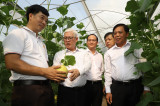ASEAN leaders engage with parliament, business, youth representatives
Prime Minister Pham Minh Chinh joined leaders from other ASEAN countries in dialogue sessions with representatives from the ASEAN Inter-Parliamentary Assembly (AIPA), the ASEAN Business Advisory Council (ASEAN-BAC), and the ASEAN Youth Organisation, as part of the 44th and 45th ASEAN Summits and related meetings in Vientiane on October 9.
Vietnamese delegation at a dialogue session with AIPA representatives
At the sessions, PM Chinh underlined the need to strengthen ASEAN unity, describing it as an objective requirement, a strategic choice and a top priority. He highlighted the importance of enhancing ASEAN's adaptability in the face of major global and societal issues, such as war and peace, climate change, resource depletion, and population aging.
In his address to AIPA representatives, the Vietnamese PM called for specific directions and drastic actions to build a connected, self-reliant, sustainable, and inclusive ASEAN Community.
He urged parliaments and governments to collaborate in promoting new growth engines, such as the digital economy, sharing economy, circular economy, and knowledge economy, and emerging sectors like artificial intelligence, cloud computing, and the Internet of Things.
The PM urged member parliaments to stay united and support each other in institution building, and exercise supreme oversight over agencies, including governments, thereby enabling them to contribute more to development goals and self-reliance of each nation.
During the dialogue with ASEAN-BAC representatives, PM Chinh called on the council to play a more active role in settling major issues in the region, saying businesses should carry forward their pioneering role and innovation, give advice to governments on institution challenges, infrastructure, and human resources, contributing to building a favourable business environment and opening up opportunities for companies to positively impact the region and individual countries.
Underscoring the importance of business connectivity, he advocated for pooling resources through public-private partnerships, technology transfer, smart governance connection, and support for workforce training.
He highlighted enterprises' role in ensuring social welfare and achieving the goal of leaving no one behind, and affirmed that the Vietnamese Government will not pursue economic growth at the expense of social equality and environment.
At the dialogue with ASEAN youth, Vietnam proposed three priorities for adapting to new global trends, such as digital transformation and green transition, for seeking solutions to social issues such as climate change, population aging, and environmental pollution, and for raising innovative ideas aimed at building the future ASEAN Community./.
VNA
 Stepping up the tradition
Stepping up the tradition
 “Fighting army, working army”
“Fighting army, working army”
 Thuan An city’s Labor Union promotes comprehensive development, improving workers' quality of life
Thuan An city’s Labor Union promotes comprehensive development, improving workers' quality of life
 Strengthening friendship between Binh Duong province and Japan’s Yamaguchi
Strengthening friendship between Binh Duong province and Japan’s Yamaguchi
 Provincial People's Committee holds a get-together for representatives of foreign diplomatic corps, organizations
Provincial People's Committee holds a get-together for representatives of foreign diplomatic corps, organizations
 The shining image of "Uncle Ho's soldiers" remains etched in the hearts of the people
The shining image of "Uncle Ho's soldiers" remains etched in the hearts of the people
 Optimization of agencies and organizations to be synchronously and instantly implemented
Optimization of agencies and organizations to be synchronously and instantly implemented
 "Win the first battle"
"Win the first battle"
 Provincial FFC further promotes emulation movements, campaigns
Provincial FFC further promotes emulation movements, campaigns
 Upholding the value of Tuong Binh Hiep lacquerware
Upholding the value of Tuong Binh Hiep lacquerware





